Weapons and Motives. Punk Planet: Year Five
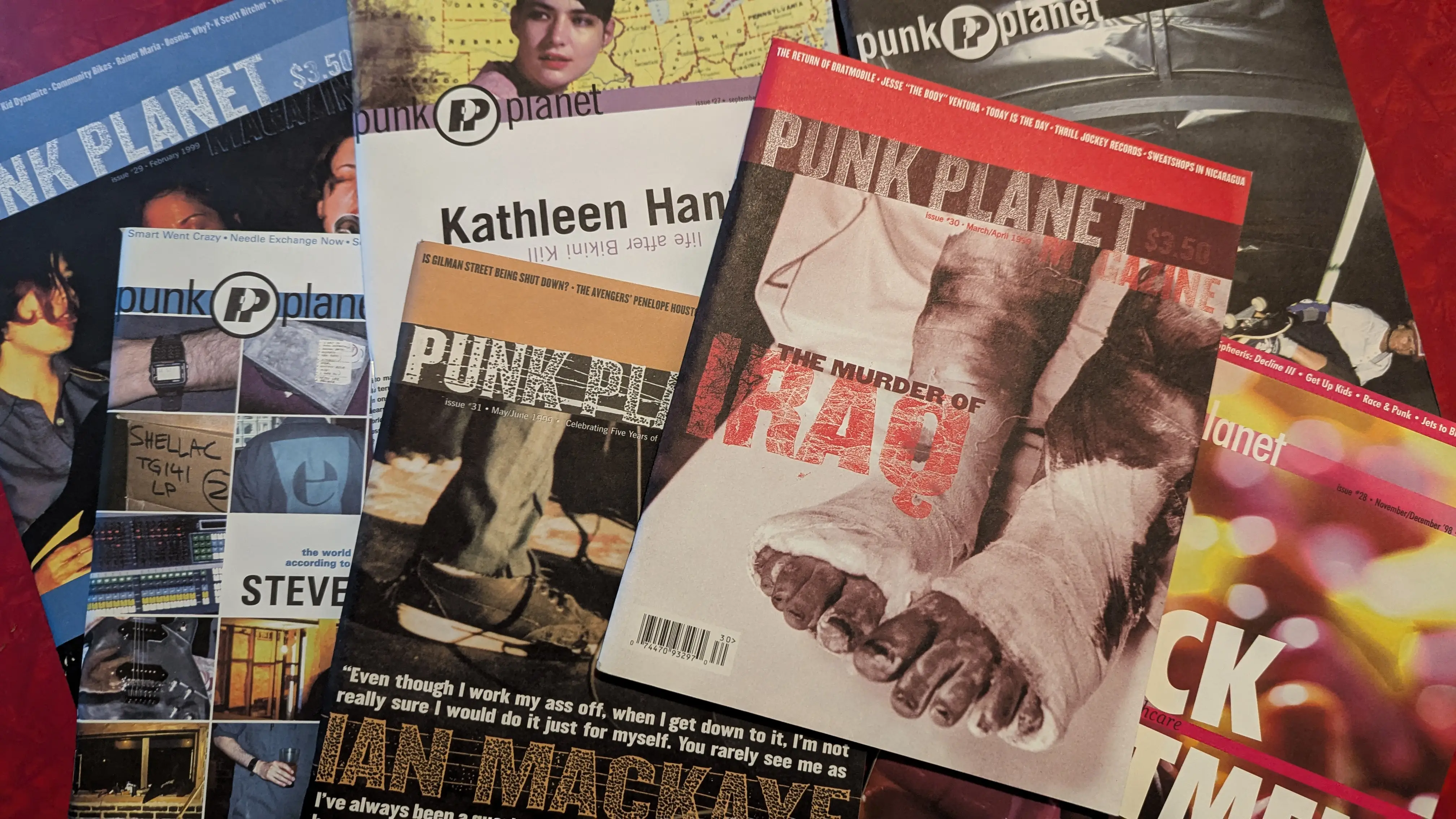
Punk Planet issues 25-31.
2024 marked 30 years since the start of Punk Planet, the magazine I ran for 13 years. To commemorate that milestone, I wrote 13 posts over 13 months, each one about a single year of the magazine. A year of learning, a year of trying, a year of making something impossible possible.
Read: Year One | Year Two | Year Three | Year Four | Year Five | Year Six | Year Seven | Year Eight | Year Nine | Year Ten | Year Eleven | Year Twelve | Year Thirteen
Memory is interesting. I sat down with a box of the fifth year of Punk Planet fully knowing that the focus of this essay would be the 30th issue, which featured a cover story called "The Murder of Iraq," about the crippling sanctions that had been imposed on the people there since the first Gulf War in the early 1990s and the destruction they caused. At the time, 1998-99, nobody was writing about the sanctions, and dedicating 20 pages to a special section about it—let alone putting it on the cover (especially with a graphic photo of bloodied, bandaged legs)—was a pretty big risk.
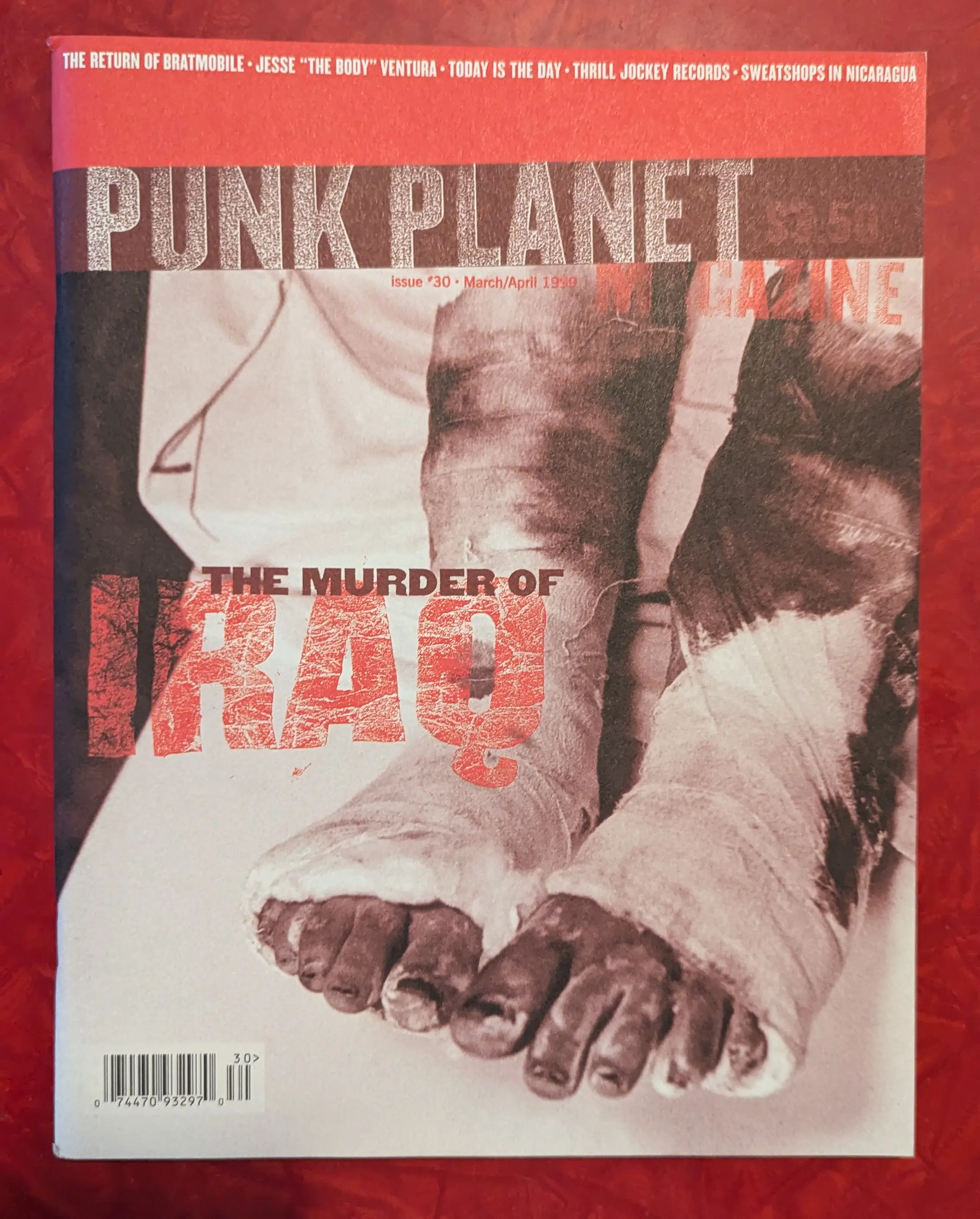
PP30, and the cover we were told would mean "suicide" for the magazine.
I remember when they received the issue, the head of our distributor called me up to say she thought we were "committing suicide" with that cover. Remember, at this point, Punk Planet was still very much thought of as a music magazine. It turned out to be one of the most important issues we ever released, selling out its run and underscoring to all of us working on the magazine that veering heavily into politics wasn't "suicide" at all, but instead an important pillar of our reporting. (Our distributor called later to apologize.)
But like I said: Memory is interesting. Because while I thought that the 30th issue was the first time we'd reported on Iraq, the most stand-out element to me about the entire fifth year of the magazine is just how much space we dedicated to Iraq, the Middle East, and other conflicts around the world.
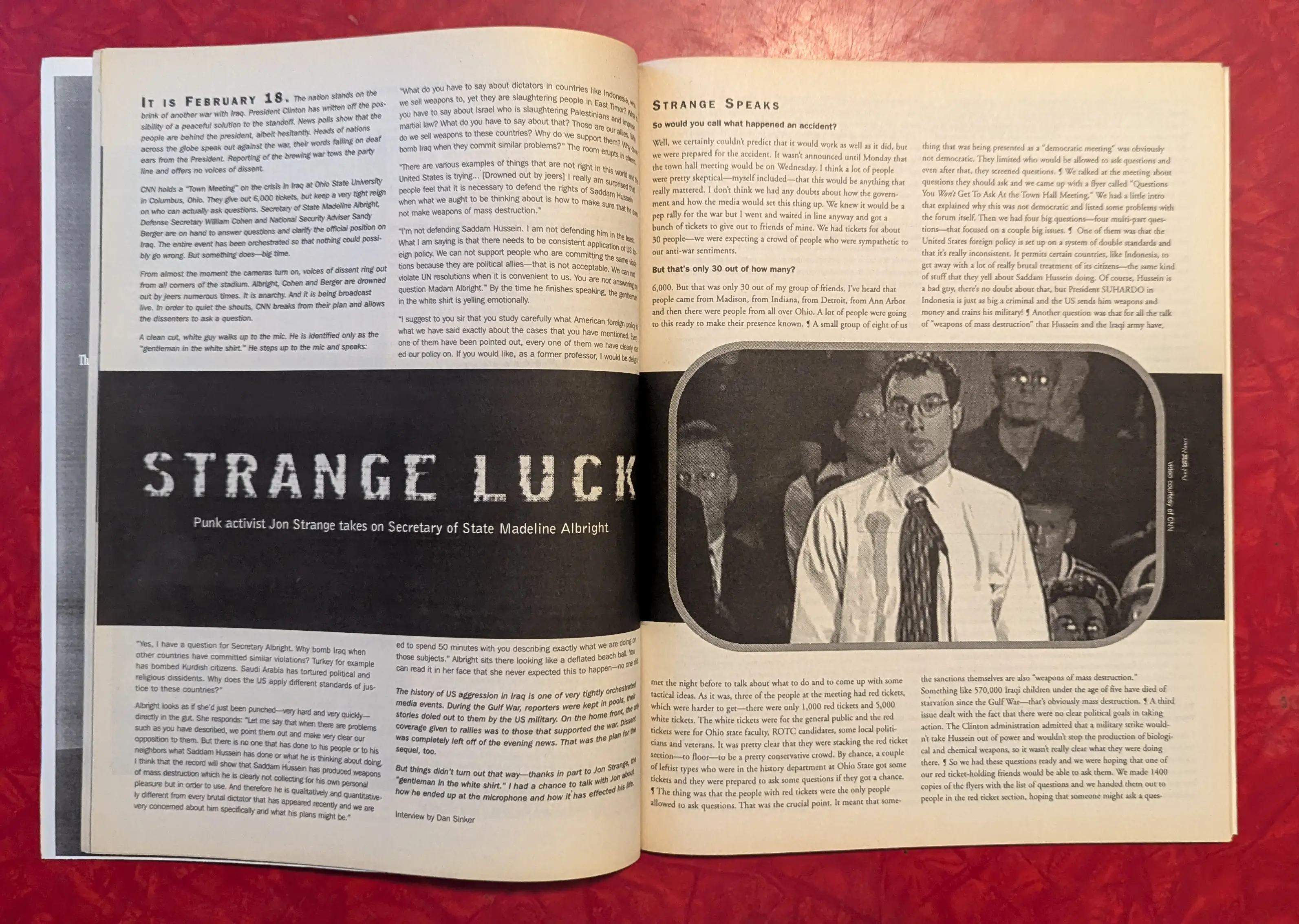
Our interview with activist Jon Strange in PP25.
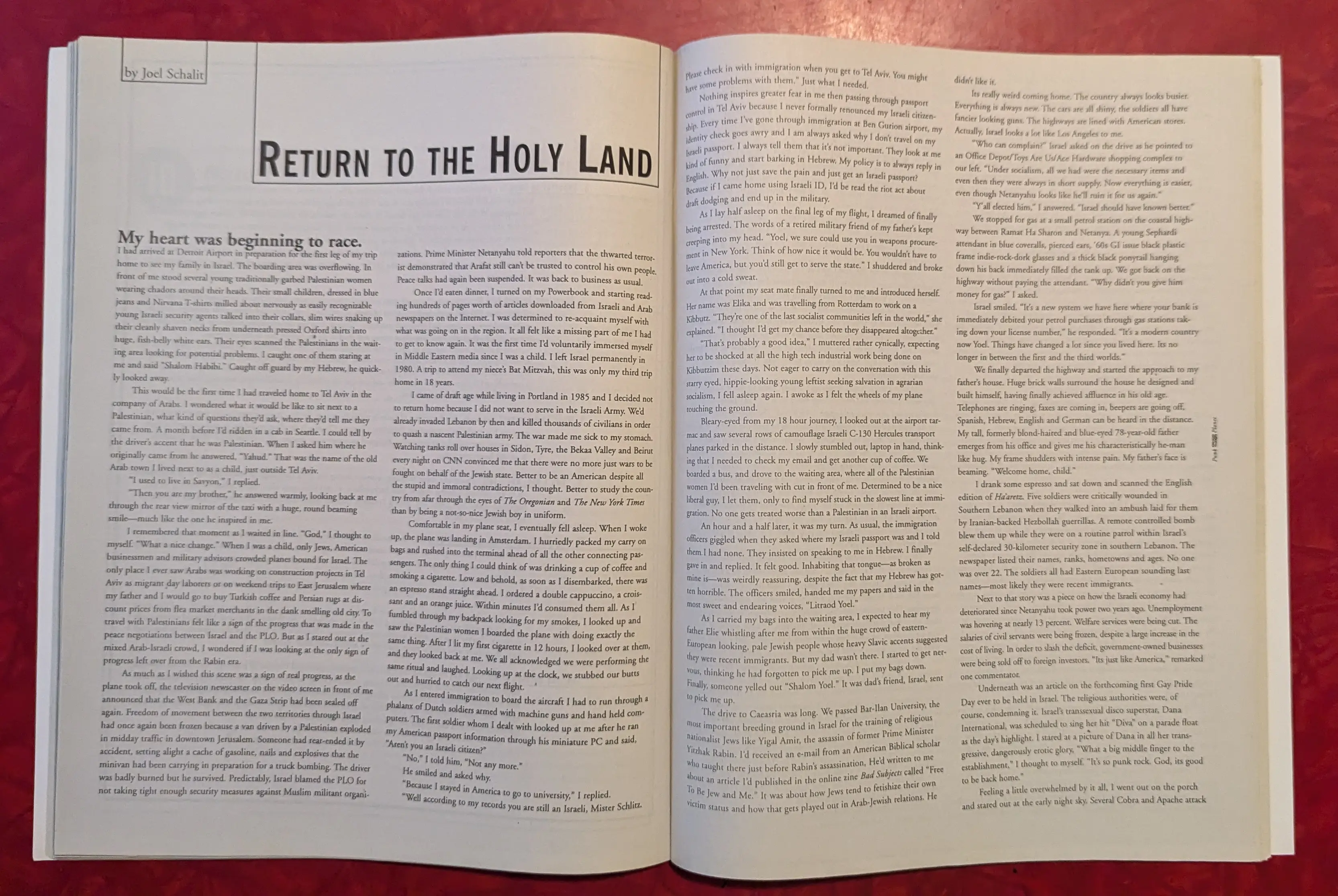
Joel Schalit's essay about going back to Israel in PP27.
There's PP25's interview with Jon Strange, who at the time was a punk activist in Philadelphia who managed to ask Secretary of State Madeline Albright a question on a CNN Town Hall when the Clinton Administration was trying to build public support for another war in Iraq. Jon and other activists strategized on how to get on camera (largely involving looking respectable in a shirt and tie) and many credit Jon's question as helping to turn a tide of public sentiment against the Clinton Administration's aggressions. When I found out he was a Philly punk, I reached out to do the interview. He was back in our pages again two issues later, with a diary from the trip to Iraq that he took with a group of "activists, workers, veterans, doctors, students, clergy, and one punk (yours truly)" to deliver medicine and raise awareness.
An issue after that, PP28, we had another travelogue (getting folks to write diaries from trips they were taking for other reasons was a great way to increase the scope of our coverage without having to foot hefty travel bills), this time from contributing editor Joel Schalit, whose regular contributions sharpened the magazine's lens of world politics. This essay, which was written at a time when Netanyahu (yes, the same guy as now) had just sealed off the Gaza Strip and the West Bank and was a pointed combination of the personal and political, which became a signature of Punk Planet's approach. "I came of draft age while living in Portland in 1985," Joel wrote, "and I decided not to return home because I did not want to serve in the Israeli Army. We'd already invaded Lebanon by then and killed thousands of civilians in order to quash a nascent Palestinian army. The war made me sick to my stomach."
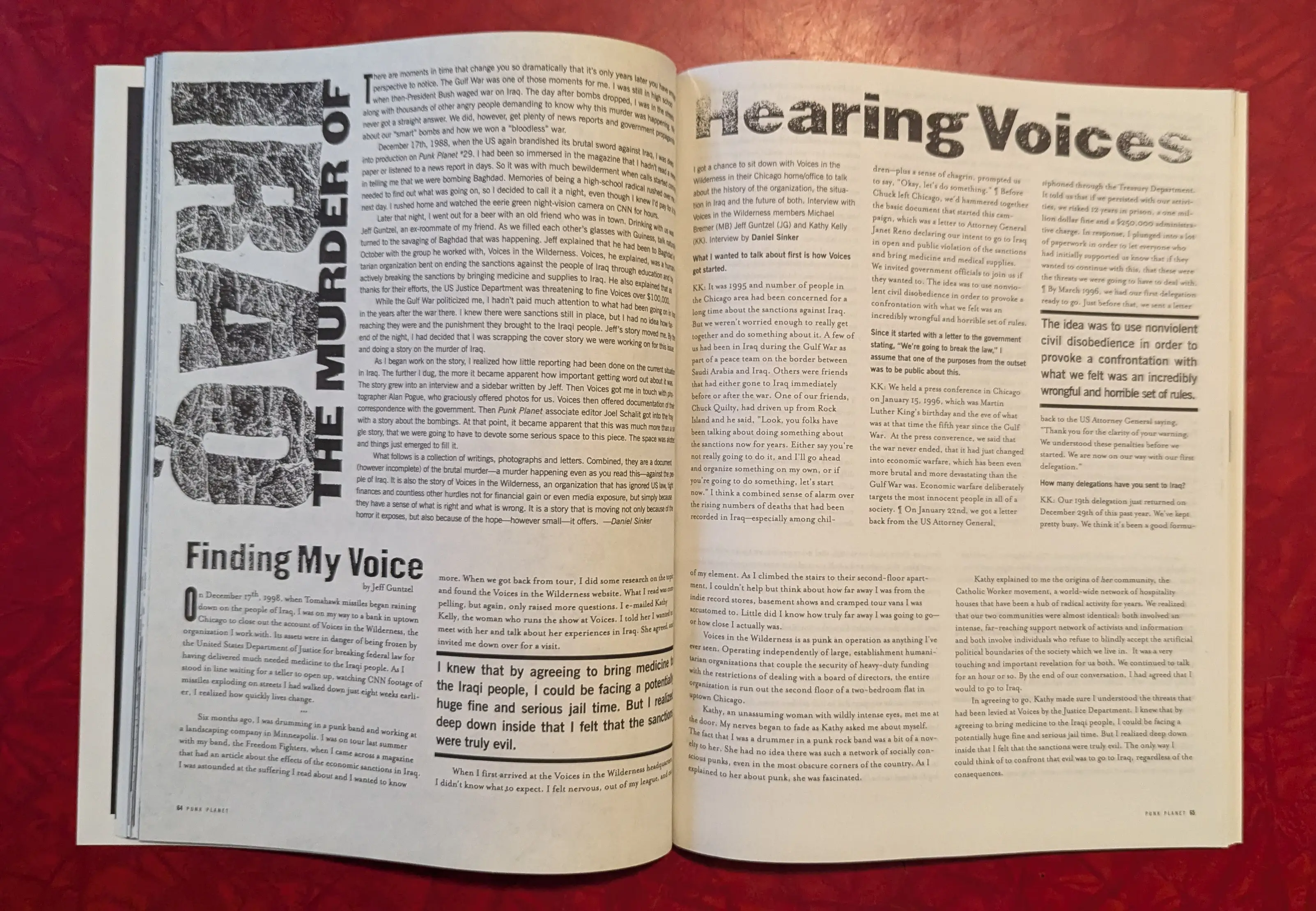
The opening spread of our "Murder of Iraq" cover section.
All of this (and there was quite a bit more over the course of the year) culminated in PP30's "Murder of Iraq" cover story, which we presented as a special 20-page section, with multiple articles, photographs, and interviews. The centerpiece of the section was "Finding my Voice," a personal essay by Jeff Guntzel about how he went from "drumming in a punk band and working at a landscaping company in Minneapolis," to moving to Chicago to travel to Iraq with the activist organization Voices in the Wilderness.
I'd met Jeff at a bar in Chicago a few months before—we had a mutual friend—and hearing his story was fascinating. I knew we wanted to feature that work and asked him to write an essay. He'd never written anything like it before, and I worked with him to bring his humanity to the fore. "The relentless compassion I was shown by the Iraqi people made it impossible for me not to cry when I watched the bombs rain down on them in December," he wrote. "To me, we weren't bombing a faceless 'enemy.' We were bombing my friends." Jeff would go on to become an amazing journalist in his own right and continued to contribute to Punk Planet to the end, including a harrowing diary of his time traveling to the West Bank a few years later.
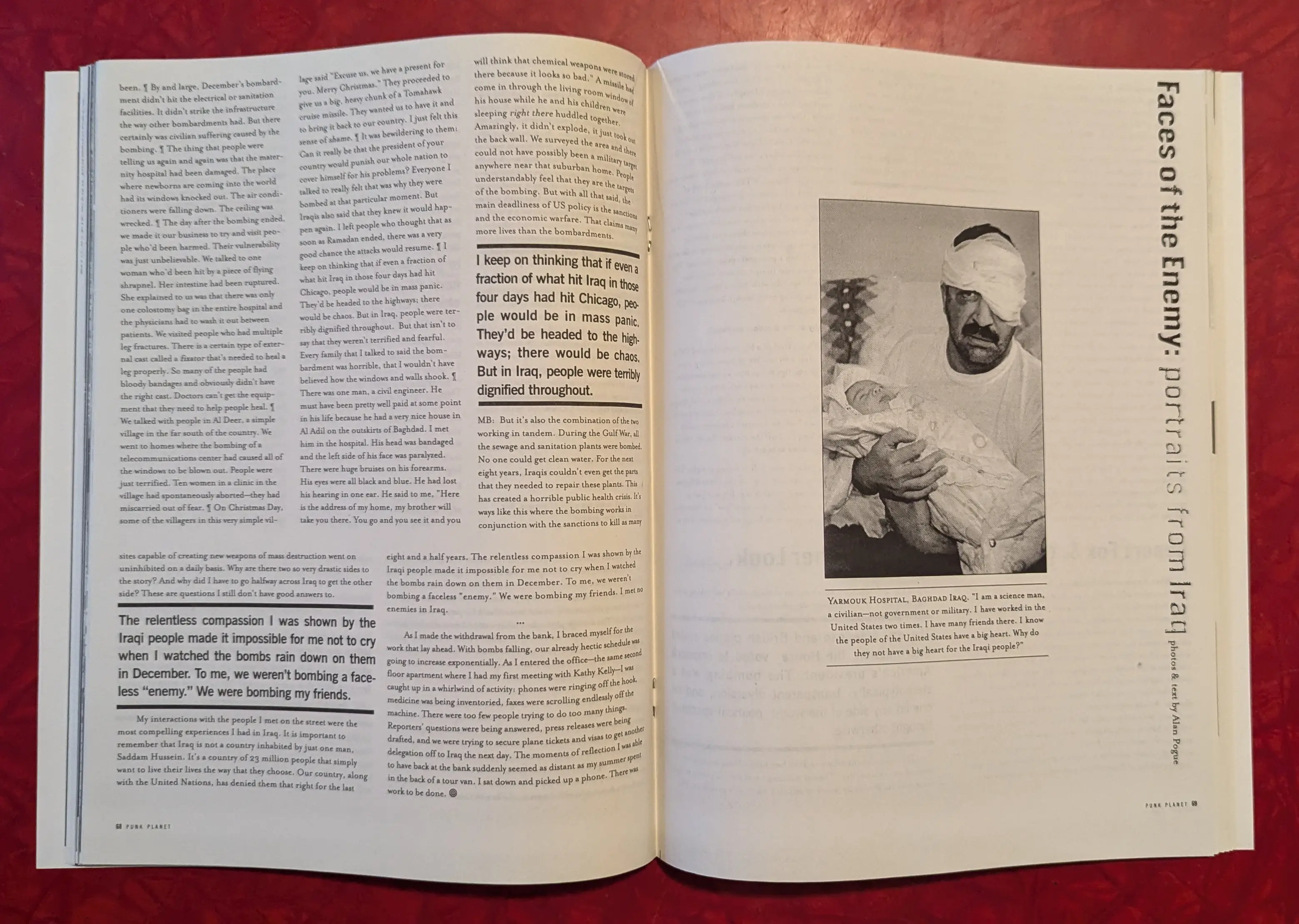
I'm still haunted by the photo of this father holding his child.
Every now and then I'm asked how, if Punk Planet was still around, we would cover various topics. I usually answer with a noncommittal "I'm not sure," because so much of making a magazine is collaborative and reflects a collective voice and vision. But there's one thing I know for certain: With the relentless bombing and slaughter of tens of thousands of Palestinians that has been going on in Gaza for almost a year now, and the harrowing expansion of Israel's bombing campaign into Lebanon in the last week, we would have covered it exactly the same way we did back then. Unapologetically and unflinchingly.
This should be a surprise to no one. Punk Planet changed a lot in its 13 years, but one thing didn't: we were steadfastly anti-war, anti-colonialist, and anti-imperialist from the moment we found our voice to the very end of the magazine. This didn't always come easy. With Jeff visiting Iraq regularly and phoning the office, our phones were tapped (which I wrote about in a personal essay back in 2013). We got death threats after September 11th. Some writers quit. It would have been easier to have just stuck to music and art, just as it would be easier to stay silent now.
We never chose the easy way, and Year Five shows why. Because the harder tack—the one that sides with people over governments, with the occupied over the occupier, and with life over death—is the right one.
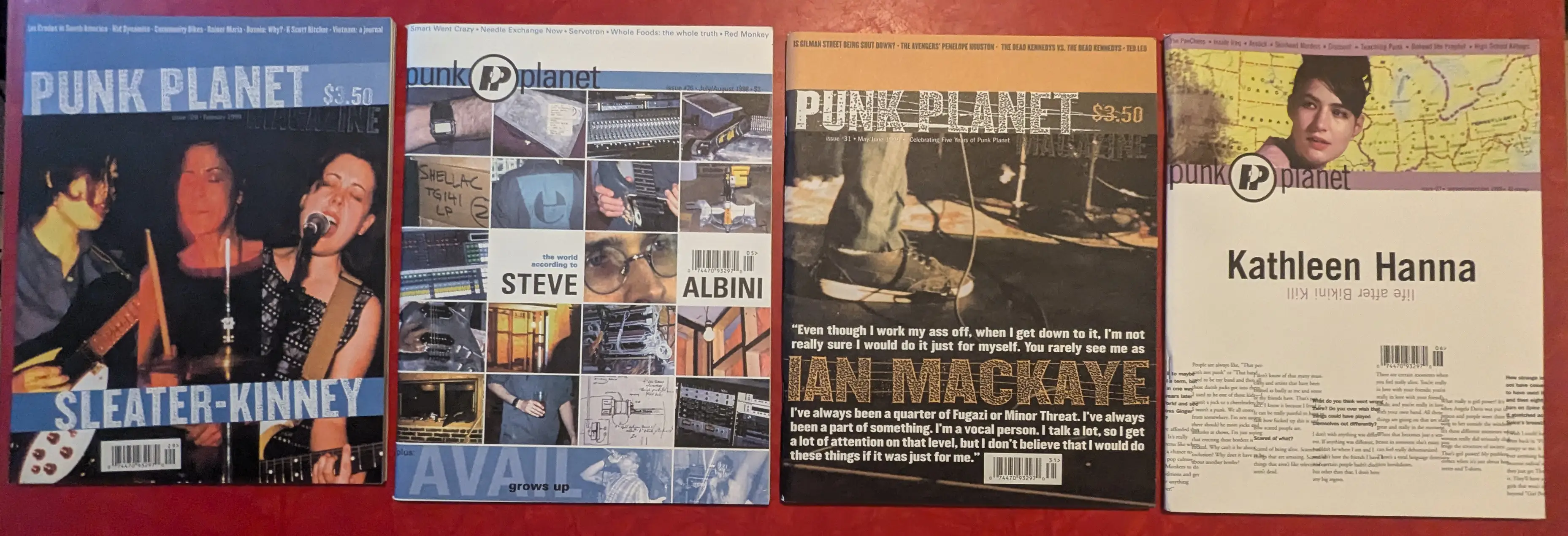
An absolute incredible run of music covers.
A few bits of Year Five miscellany: While global politics was the focus of this essay, Year Five also featured cover interviews with Steve Albini (RIP), Kathleen Hanna, Sleater-Kinney, and Ian MacKaye, perhaps the best lineup of bangers we ever had in a single year. Year Five also saw the cover price increase from $2.00 to $3.50, a move so controversial that letters arguing about it fill three issues worth of letters sections. Finally, PP29 marked the standardization around Knockout as our feature typeface, which would stick around for the rest of the magazine's lifespan and, to me, defines the signature look of the magazine.
Published September 29, 2024. |
Have new posts sent directly to your email by subscribing to the newsletter version of this blog. No charge, no spam, just good times.
Or you can always subscribe via RSS or follow me on Mastodon or Bluesky where new posts are automatically posted.
Other Recent Posts
A meditation on death, grief, and the card game Magic: The Gathering.
Posted on Jul 3, 2025
Things End: Punk Planet, Year 13
For more than a year, I've been writing essays about Punk Planet, the influential, incredible, miracle of a magazine I worked on for 13 years. For more than a year I've been dreading writing this ending, because the reality is this: Sometimes things end and you never, totally get over it.
Posted on May 30, 2025
We're living through the Who Cares Era, where completely disposable things are shoddily produced for people to mostly ignore, while the government stomps its uncaring boot on our necks.
Posted on May 23, 2025